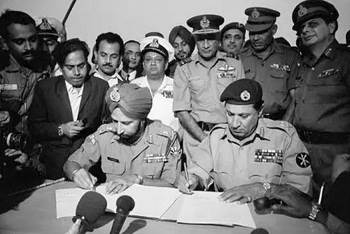Mukti Bahini was constituted in Bangladesh in 1971 for freedom struggle. The part which is now known as Bangladesh was known as East Pakistan earlier. When the freedom struggle started in the country, Bangladeshi leader
Sheikh Mujibur Rahman, constituted the Mukti Bahini to fight with the Pakistani accord. It consisted of Bangladeshi military, paramilitary and civilians during the War of Liberation . They are more commonly known as Bangladeshi forces, Mukti Fauj formed from guerilla resistance movement.
They learnt the art of guerilla-warfare from India and used it to obtain freedom for their nation against Pakistan. There were also several women who served in the Mukti bahini and fought gallantly. Few names are; Taramon Bibi (for war), Sitara Begum (for setting up hospital), Nazma Shaheen. The Mukti Bahini also trained their female leaders in guerrilla warfare.
During the Indo-Pak war of 1971, it became a part of Bangladesh- India Allied forces.
• When there was an ongoing war between Bangladesh & Pakistan, a lot of refugees fled to Indian borders inside West Bengal, Tripura and Barak Valley.
• The refugees and Mukti Bahini got strong support from Indian civilians and media.
• The then Prime Minister, Indira Gandhi issued a diplomatic, economic and military support to the Bangladesh Forces in April 1971.
• The Indian Army provided its support, army bases, training camps and warfare art to the Mukti Bahini during this period.
• Mukti Bahini soldiers were also allowed to cross the Indian borders by their own will.
• They set up their secretariat in exile at Calcutta
• India increased its support to the Mukti Bahini after signing the friendship treaty with Moscow.
The Mukti Bahini always enjoyed immense international support.
There are various honors that were conferred on the soldiers of Mukti Bahini (highest military awards in Bangladesh):
• Bir Sreshtho (The Most Valiant Hero) - awarded to 7 soldiers.
• Bir Uttom, Bir Bikrom and Bir Protik
